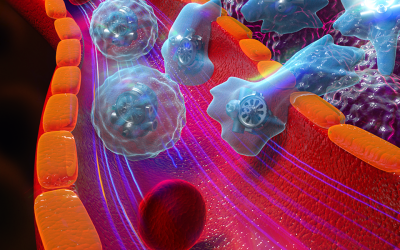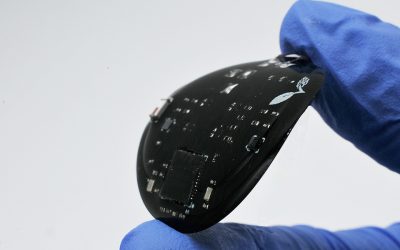Following up on his recent essay, “Will the real Graphene please stand up?”, Materials Views caught up with Professor Martin Pumera from the Nanyang Technological University, to find out more his views on science and his research.
LS: What attracted you to science and how did you get to where you are now?
Well, there were many influences, but as far as I recall, as child I liked the novels of Jules Verne, full of interesting machines and exotic countries. My interest in science as a school-boy was supported by my mother, who was subscribing to popular science magazines. At that time, in the socialistic country, things like that were not cheap so I am grateful to her for this. Another strong influence was my wife, who I must credit strongly for anticipating that without learning English, I will never get anywhere. She was as always right and now I teach three hundred students in Singapore.
LS: Were there any strong childhood influences that lead you to this career?
I was not particularly fond of chemistry at elementary school; I liked physics and mathematics more. However, in seventh grade I had pneumonia and I had to spend a lot of time in bed – which I spent reading the marvelous book “Chemistry Around Us” – and I was hooked to chemistry ever since.
LS: How did you view science and scientists as a child?
Quite differently than now. I had this view of a scientist which sits in his chair and he gets all the ideas just because of quietly thinking in his office. Success in experimental work was in my imagination connected to the lucky accidents. The reality is of course different, without interactions there are no new ideas and without hard work, there are no results.
LS: Did you have any particular mentors?
Once I was out of University I had one great mentor, from whom I learned nearly everything I needed to succeed as scientist: how to write a paper, how to organize results, how to work efficiently… This mentor was my first post-doc supervisor, Prof. Joseph Wang (then at NMSU, now UCSD). I was also influenced a lot by the book “Surely You’re Joking, Mr. Feynman!”.
LS: What would you have done if you had not taken this career path?
Personally I do not like to think of my work as career path but as a path of passion and love for chemistry. I of course understand your question – there are several other jobs I would hopefully enjoy but I know that I would have felt that I was missing something. I can see many people which work in jobs they are not that happy in. So I try to work extra hard in my position as I am the fortunate one who has the job of his dreams.
LS: You have worked in several different countries, can you comment on the differences between research communities in different locations?
It always depends on the personality of the scientist and on the environment the school/center creates. However, if I might generalize, it is my impression that Japanese scientists are in general very careful and sometimes shy to publish their work in high impact journals while researchers in Spain and Singapore do not have such restraints.
LS: What caused you to specialize in nanomaterials research? How does this work fit into a wider scientific/general context?
From a personal view, as nanotechnology merges all the disciplines, it pushes you to think out of the box of your discipline. I see myself as a chemist but I also enjoy a lot of physics and biology so in nanotechnology, you can freely move from one to another. Nanotechnology allows us to create materials of unseen properties. There is hope that such nanomaterials can lead to breakthrough in major areas, such as energy production and storage, disease treatments and many more.
LS: What influence do you believe your work will have?
I like to look into the fundamental factors which are behind the applied research. I believe that without understanding the underlying principles, the applied research is just a “house of cards”.
LS: What do you see as the biggest challenges facing researchers who study nanomaterials, graphene, and related systems?
The biggest challenge for any nanomaterials based research is to have the material fully characterized in detail. Even in “ordinary” chemistry and physics, impurities play often a major role in the chemical/physical properties of materials. As nanomaterials are a “new” class of materials, problems with impurities and lack of detailed characterization are more important than ever. Without full knowledge of your materials you cannot be sure where its properties originate and basically, the results are useless.
LS: What do you see as the biggest challenges facing the scientific community, and the rewards and outcomes of solving such challenges?
Developing materials for sustainable growth – if the words “sustainable” and “growth” ever can coexist in the same sentence. The reward is long-term survival of our civilization.
LS: What is the most exciting research paper that you have read recently?
I recall an excellent paper from Gómez-Navarro et al. (Nano Lett., 2010, 10, 1144). They studied chemically reduced graphene in great detail, first elucidation of its specific atomic scale features. Even though chemically reduced graphene has been used quite a lot in the research, they were the first to actually look at this! Such excellent piece of research is exactly the one you would like to see all around.
LS: What motivated you to write “Will the real graphene please stand up?”? What do you hope will be the effect of the piece?
I wrote the “Will the real graphene please stand up?” opinion as I often encounter articles which state that they work with graphene but when you look into them, they do not. Very often, there is no characterization of the “graphene” presented and one may wonder: is the used material really graphene? This is pronounced by the fact that the most popular preparation methods of bulk amounts of graphene actually result in fabrication of multilayered structures. I hope that scientists will become alert about this problem and they will produce more high quality papers one can rely on.
LS: Which of your publications are you most proud of? Which is your favorite piece of your own research?
I value the most my research on impurities within carbon nanotubes. In our last article, we show that most of the electrochemical activity of carbon nanotubes is actually due to the presence of the nanographite impurities contained within them (Chem. Eur. J, 2010 (in press)). This is in contrary to what hundreds of groups and thousands of other papers have suggested. I value this piece the most as we went against a huge amount of literature and I hope we cleaned the field a bit.
LS: What is your biggest passion outside of science?
I always liked travelling. Even though now with small children at home and students in the lab my wife and I cannot travel as we would wish, we have been living and working in amazing countries like USA, Spain, Japan and Singapore so I see that as higher level of traveling, that is living in and understanding the particular culture, learning to respect the differences and gaining from that.
LS: What is your personal goal and what would make you consider your life to have been successful?
My personal goal in science is to stay scientifically honest, producing research which can withstand the flow of time and newer literature. From a personal point of view, I hope I can be a good father and husband – after all, family matters the most.
LS: What do you see as the most important scientific achievement of the last 100 years?
It is clearly the discovery and industrial production of antibiotics.
LS: To whom, or for which work, would you award a Nobel prize?
Nikola Tesla should have received the prize. Looking to the present time, the work of Prof. Antonín Holý on antiretroviral drugs would be worth considering.
LS: What do you think are the most important traits for a scientist in modern times?
When reading old literature, I suspect that the traits are the same throughout history. In my opinion they are creativity, imagination, persistence and hard work.
LS: Finally, what should scientists aspire to?
As the most of the scientists are funded by taxes, we should aspire to give as much as possible back to society, i.e. by educating students, creating and disseminating new knowledge of high value… in short, we should be working hard to do our job right.
















